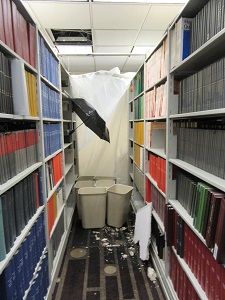 In early September, the MSK Library experienced a flood. Due to a pipe bursting on a floor above, the water eventually found its way to our collection of journal back issues. These print journal issues are used not only by staff, but form part of the larger collection used for external document delivery requests from libraries all across North America and beyond. The journal titles that were damaged the most included Nature and The Lancet – two titles that are heavily used and for which we don’t hold subscriptions to the complete archives in electronic format.
In early September, the MSK Library experienced a flood. Due to a pipe bursting on a floor above, the water eventually found its way to our collection of journal back issues. These print journal issues are used not only by staff, but form part of the larger collection used for external document delivery requests from libraries all across North America and beyond. The journal titles that were damaged the most included Nature and The Lancet – two titles that are heavily used and for which we don’t hold subscriptions to the complete archives in electronic format.
While this experience was one none of us would want to see repeated, I can’t help but reflect on how quickly the library team pulled together to minimize the damage. There were some that rushed to remove the books and journals, others that ran to gather all of our waste receptacles so that the water would fall in these containers rather than on the carpet, and still others who remained up front to continue to handle users’ requests and direct facility personnel to the affected area.
What ran through my mind that day was something that I learned from a past project management course — form, storm, norm, and perform. When teams and other groups of people come together, they typically go through a number of developmental stages. This social process usually takes time and the outcome reflects a high performing and successful team.
Form – This stage is when people first come together to find out about each other and the work that needs to be done. One might call this the “honeymoon” period and the time to explore each others’ strengths and opportunities.
Storm – At this point, the team starts to get more into their work (e.g. library operations activities) and can often argue about things that were not clarified. This is the stage where differences might need to be resolved and where the team might experience cohesion issues.
Norm – This stage is when roles and personal conflicts are sorted out and the focus is on getting the project or task completed. It is the time where group rules develop and are refined.
Perform – This is the last stage where the team reaches an optimal level of performance and where each member contributes to the task at hand. The people-related activities, while important, are not the focus. At this stage, it is all about ongoing performance management and motivation.
The day of the flood, the library team did not disappoint. Each member of the team delivered and focused on their contribution, ensuring minimal damage to our print collection. It was impressive how quickly each person responded to the situation. Few words were spoken yet I could definitely see the library team in action!
Donna Gibson
Director of Library Services